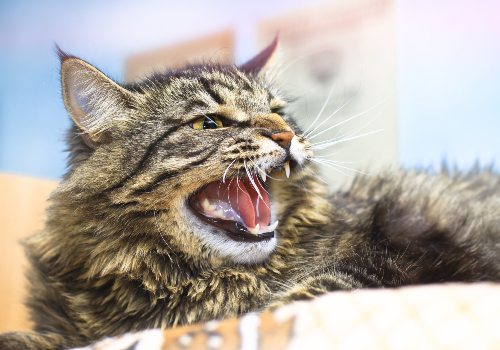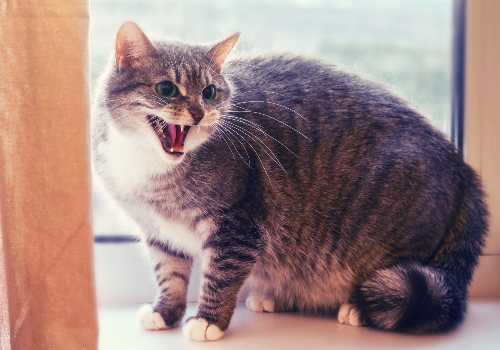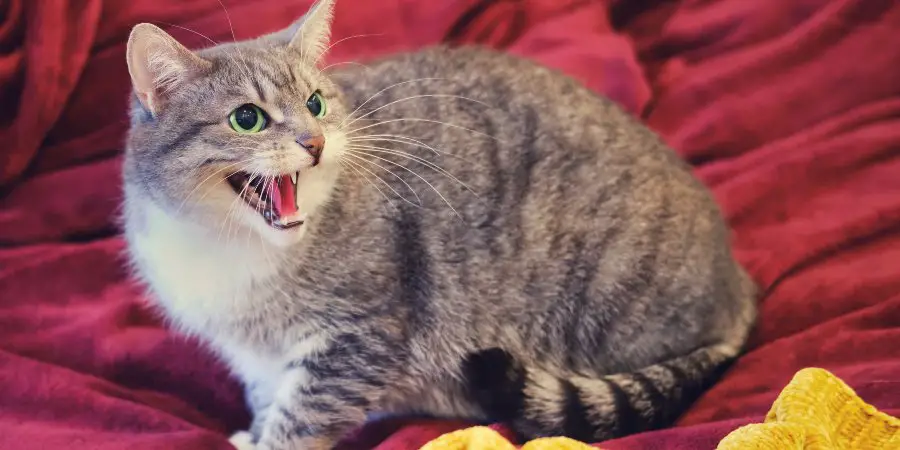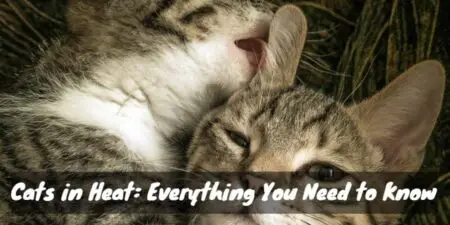Ever wondered why cats hiss during playtime? It’s a fascinating aspect of their behavior that might seem confusing at first. But don’t worry, we’re here to unravel the mystery behind those feisty feline hisses.
Cats are natural-born hunters, and playtime often mimics their predatory instincts. When they hiss during play, it’s their way of expressing excitement, fear, or agitation. Understanding the context in which the hiss occurs is essential to determine its meaning.
First, the Origins of Cat Hissing
Cats hiss at other animals they do not recognize as enemies or predators. Cats do not hiss to express aggression; instead, they use this noise to communicate with their owner. It’s believed that heeling, or following closely behind their owners at home, and even sitting on their owners’ laps were the first steps cats took to get closer to humans. The behavior meant victory for the cat in its attempt to communicate, and when the cat gained victory, it would begin to hiss.
What’s Going on Inside the Brain of a Hissing Cat?

Heeling is a defensive response. A cat is more likely to hiss if the area that they feel is threatened. When your cat hisses at you, it is not out of aggression but rather an unconscious reaction triggered by a perceived threat. It may be an attempt to communicate with you or a desire to get away from you. In some cases, cats housed with other animals will let them know that they are not happy living in close quarters.
Why Do Cats Hiss?
Cats hiss as a form of communication. They may use it to let a cat or human know they are uncomfortable. Heeling may be a way for the animal to let its owner know something is wrong and may need attention. Sometimes you will even notice your cat heeling in an attempt to get out of the bathtub since cats don’t like water being poured over them when bathing.
1. The Warning Hiss
The warning hiss is used when an animal feels threatened by another animal or human. The reason for a cat hissing at a person can be because of unwanted behavior, or perhaps because their owner has just moved them into a new space where they feel that their safety is being threatened. If your cat hisses at you, try not to get startled and give them plenty of space until they settle down.
2. The In-pain Hiss
This hiss is used in situations where the cat feels pain. It may mean they broke a bone or felt their owner hurt them. Try not to respond to this aggression, as you may worsen the situation. If your cat hisses at you, take them to their veterinarian right away so that a professional can see them.
3. The Feline Non-Recognition Aggression Hiss
This hiss is used when a cat feels threatened by another cat or a human. It’s often used in the presence of strangers trying to interact with the cat. The hiss is an attempt at getting the intruder away from them, and many times they will hiss at humans before they attack, so you must learn what to do if your cat hisses at you.
4. The Play Hiss

This hiss is used when a cat is playing and is putting on a show for its human. If the cat is hissing at you, your purpose should be to keep them safe and try not to get distracted. An excellent way to do this would be to keep an eye on them and be waiting for them to settle down since they may try to get away from you if they feel that you are asking them to do something that will put their safety at risk.
5. Unfamiliarity Hisses
The hiss can occur when the cat does not recognize the individual or animal, causing fear. It can happen for various reasons, including if the person being interacted with is acting aggressively, smells like another individual your cat knows, or perhaps just because of how they are dressed. The best way to handle these situations is to keep your distance and let the cat appear closer to its owner before realizing they are still worried about it.
6. Stressed Out Hisses
Stress is common in situations where you are trying to interact with your cat, but they are too afraid of being petted or held down. This behavior may also occur with other family members that try to interact with a cat in ways that the cat does not like. If the cat is hissing at you, it may be because you have been too rough with them or because they do not recognize you as someone they can easily interact with. The best way to deal with this type of hiss is to make sure that you understand how your cat feels and feel safe while being petted.
7. Pregnant Hisses
The pregnant hiss can occur any time the cat expects their kittens or the mother knows she will soon be giving birth. It may be a form of warning the others around them so they don’t get too close to her (similar to how human infants cry when hungry). If your cat is hissing at you, you should do your best to understand why she is afraid and find a way to make it easier for her, such as putting her in a different room to give birth in private.
What Should You Do if a Cat Hisses at You?
When a cat hisses at you, there are several steps that you should take. First, don’t get startled; give the animal plenty of space. Be careful not to corner them or try to pet them, as they may feel less safe and more threatened. Try talking in a soft tone not to upset the cat, or try rubbing their ears and paws in an attempt to calm them down. After a few moments, the cat should calm down and be ready to receive your pets and attention.
In some cases, the hissing may worsen if you try to intervene. Rather than understanding what the cat is trying to communicate in this way, it is better to leave them alone and wait until they feel more comfortable. Of course, if they are being aggressive while they hiss at you, you must recognize this behavior and stop engaging with them.
How to Handle a Cat Hissing at You

If your cat is hissing at you when you are home, there are steps that you can take to try to help the situation. If you have recently moved into a new home, it may take some time for your cat to get used to its new territory. If this is the case, try to provide time for your cat to adjust before bringing them back into your home.
If this is not possible, you should try to ensure that the area in which the cat hisses at you does not get too crowded with other animals or humans. It can help prevent your cat from feeling like its environment has significantly changed.
Is It OK to Discipline a Cat for Hissing?
Don’t try to discipline your feline friend for hissing at you if you want to get accomplished. It may be a way that they are trying to communicate with you, but it may also be another way that they are trying to protect themselves from being hurt or intimidated. If you are right in front of the cat and they have just hissed at you, try not to get frightened and give them plenty of space as a form of comfort. If they continue, you may have to try again later.
Sometimes your cat will hiss at you a few times and then ignore it. It could mean that they are beginning to realize that you are not something they should be afraid of, or it could just be a way for them to let you know that the hissing was an attempt to communicate something important.
What Humans Can Learn from Cat Hissing

When you hear a cat hissing at you, it can often signify that they need your attention. You must give them the time they need to adjust to their new home, and if that is not possible, try to provide them with a safe environment. You mustn’t respond aggressively if you want to teach your cat to hiss at humans. It would be best to try talking in a soft tone not to freak out the animal.
If your family members are interacting with the cat in ways they don’t like, try to be patient and let them adjust occasionally. If you are trying to teach the cat to hiss at humans, it may be helpful to exercise some patience and give your pet time to get used to their new environment.
Conclusion
Cats will hiss when they feel threatened, and there are many different reasons why they might do this. If a cat hisses at you, it isn’t wise to get alarmed or try to pet them since this may put its safety in danger. Try not to respond aggressively and wait until the cat is ready to be petted and interact with you.
Why Cats Hiss (Video)
Related Questions
#1. How can you tell the difference between a play hiss and a warning hiss?
The key to differentiating between a play hiss and a warning hiss is observing the context and the cat’s body language. A play hiss typically occurs when a cat is engaged in play with toys, other cats, or their owner, and their body language is relaxed and energetic. On the other hand, a warning hiss is accompanied by defensive body languages, such as flattened ears, an arched back, or puffed-up fur. The cat may growl or display their teeth, indicating they feel threatened, and may attack if the perceived threat doesn’t back off.
#2. Can hissing be a sign of an underlying health issue in cats?
Yes, hissing can sometimes indicate an underlying health issue in cats. If a cat is experiencing pain or discomfort due to an illness or injury, it may hiss when touched or approached. This behavior change can be a sign that something is wrong, wildly if the cat doesn’t usually hiss or act aggressively.
#3. Should I be worried if my cat hisses at a new pet in the household?
It’s not uncommon for cats to hiss at new pets introduced into the household, as they may feel threatened or territorial. While this behavior may be concerning initially, it’s essential to give both animals time to adjust to each other’s presence. Ensure that each pet has its space, including separate food and water dishes, litter boxes, and sleeping areas. Gradually allow them to interact under supervision; over time, they will likely become more comfortable with each other. However, if the aggression between the pets escalates or doesn’t subside, consider consulting a professional animal behaviorist for assistance.
#4. How can I help my cat feel less threatened and stop hissing?
To help your cat feel less threatened and stop hissing, it’s important to identify the cause of their stress or fear. If the cat reacts to a specific object, person, or animal, try to minimize their exposure to that stressor. Provide your cat with a safe and comfortable environment, including hiding spots, elevated perches, and familiar items like toys or bedding. You can also use calming aids such as Feliway, a synthetic pheromone that mimics a cat’s natural calming signals. Be patient and give your cat time to adjust, and remember to never punish them for hissing, as this may only exacerbate their fear and anxiety.
#5. Do all cats hiss, or is it specific to certain breeds or personalities?
Hissing is a normal feline behavior that is not specific to certain breeds or personalities. All cats have the ability to hiss as a form of communication, warning others when they feel threatened or uncomfortable. However, individual cats may vary in how often they hiss or the specific triggers that cause them to hiss. Some cats may be more prone to hissing due to their past experiences, temperament, or socialization level. Observing and understanding your cat’s specific cues is essential to ensure their comfort and well-being.
"In ancient times cats were worshipped as gods; they have not forgotten this."
-- Terry Pratchett





